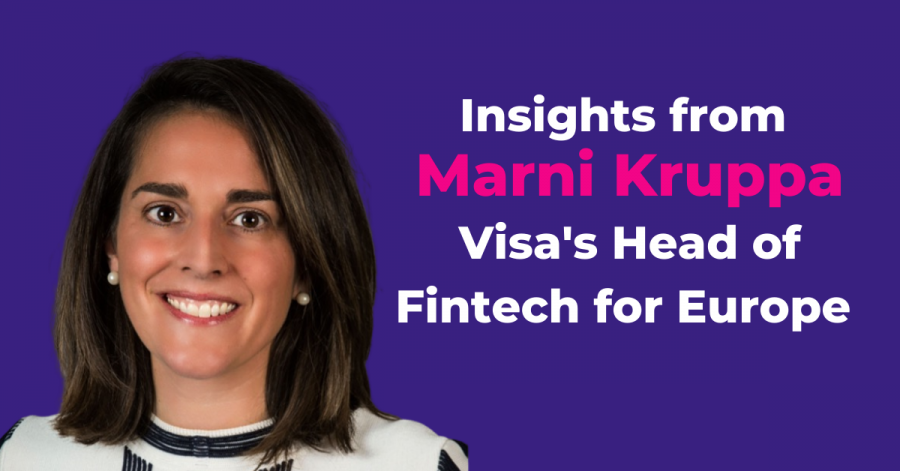The successful completion of the third season of the Visa Innovation Program was officially celebrated on the Demo Day of the Program on the 1st of December when the cohort of emerging regional fintech leaders showcased their progress. All kinds of fintech solutions and topics were presented during the event – from financial literacy and open banking to buy-now-pay-later, urban mobility, and wealth management.
The Recursive met with Marni Kruppa, Visa’s Head of Fintech for Europe to explore the global trends in fintech and to find out how fintech solutions are changing the world. Take a look into the world of digital payments, see what it is like to be the Head of Fintech for Visa Europe, and get some insight into the current trends that are shaping the future of finance.
Stay tuned for the upcoming season of the Visa Innovation Program, which will be announced at the beginning of 2022.
Visa as a driver of industry-wide innovation
As Kruppa explains, the main mission of Visa is to connect the world through the most innovative, reliable, and secure payment network. “We think that fast and reliable digital payments should be available to everyone, everywhere. From the perspective of the COVID-19 we see how important are fintechs for realizing that idea because digital payments are no longer just a convenience, but a necessity,” she shares.
According to Visa’s Head of Fintech for Europe, the goal of the company is to support businesses, communities, and individuals and to help them thrive after the pandemic. To achieve this goal Visa is partnering and investing in fintech companies. “Through our broad network of partners, we can meet the growing customer demand for faster and more reliable digital payments – payments of a new generation. We strive to create an inclusive and diverse leadership culture,” Kruppa explains. To achieve that, Visa is partnering with companies like Omnio group, Revolut (digital banks), Currencycloud, Shieldpay (payment infrastructure and security), and Vipps (e-wallet).
In addition, Visa is investing in fintech companies like Klarna (alternative lending), Plaid (digital banks), Bankable, Marqeta, Minna Technologies, Square, Stripe (payment infrastructure). Their Fintech Fast Track program has so far helped 93 European fintechs to achieve their goals of providing their customers with better products and services. The company has also launched Visa Fintech Partner Connect, a program that helps its clients meet customers’ demand for new digital payment experiences by combining Visa’s expertise and capabilities with those of carefully selected fintech partners.
The fintech trends with the biggest impact
From Kruppa’s perspective, the trends in fintech that will have the biggest impact on society in the next three to five years are all connected to the growing demand for digital payments.
She highlights that as of June 2021, 29 countries across Europe have raised their contactless payment limits. In addition, The Visa Back to Business Study, 2021, reveals the shift in consumer purchasing behavior is significant. Nearly two-thirds (65%) of consumers would prefer to use contactless payments as much as, or even more than, they are currently, and only 16% say they would revert to their old methods of payments post-pandemic.
“The shift among merchants has been equally pronounced. The proportion of merchants selling online for the first time has increased from 27% to 43% since June 2020. As online commerce becomes more popular, we are launching new technologies such as Tap to Pay, which securely stores consumers’ payment details so that when they return to the site they can pay with a single click,” Kruppa explains.
Fintech disruption in the customer experience space
Marni Kruppa highlights that her favorite example of disruption in the customer experience enabled by fintech solutions is connected to the ability to use smartwatches to pay for everything, everywhere. “There’s a strong combination of technology – contactless payment, tokenization, wearables, and others – but what I appreciate most is that this is a disruption that still impacts my daily life,” she notes.
According to her, digital payments are the future of the banking sector. They are enabling businesses to manage their cash flow more effectively, and real-time payments help drive efficiency for businesses making payments to customers, employees, and other businesses. With Visa, businesses can pay suppliers or employees anywhere in the world. “Our Visa Direct technology supports businesses to make real-time account-to-account payments. Examples are companies like Uber paying their drivers in real-time; employers sending expenses reimbursements and insurance companies paying out claims,” Kruppa says.
In addition, as digital currencies grow in popularity, Visa can help to make cryptocurrencies more safe, useful, and applicable for payments through our global presence, partnership approach, and trusted brand.
Looking ahead: future developments in the fintech sector
“Seeing that fintechs are the future of the banking sector, we think that small and micro-businesses must have equal opportunity to implement fintech in their day-to-day transactions. Educating merchants and customers about the broad use of fintechs is crucial for the survival of all small and medium businesses,” stresses Kruppa.
In addition, she outlines that there are still massive amounts of underbanked and unbanked individuals all around the world. “While I’ve seen significant improvement and development in this space, with technology unlocking access and driving positive change, there’s more to do,” Kruppa concludes.








